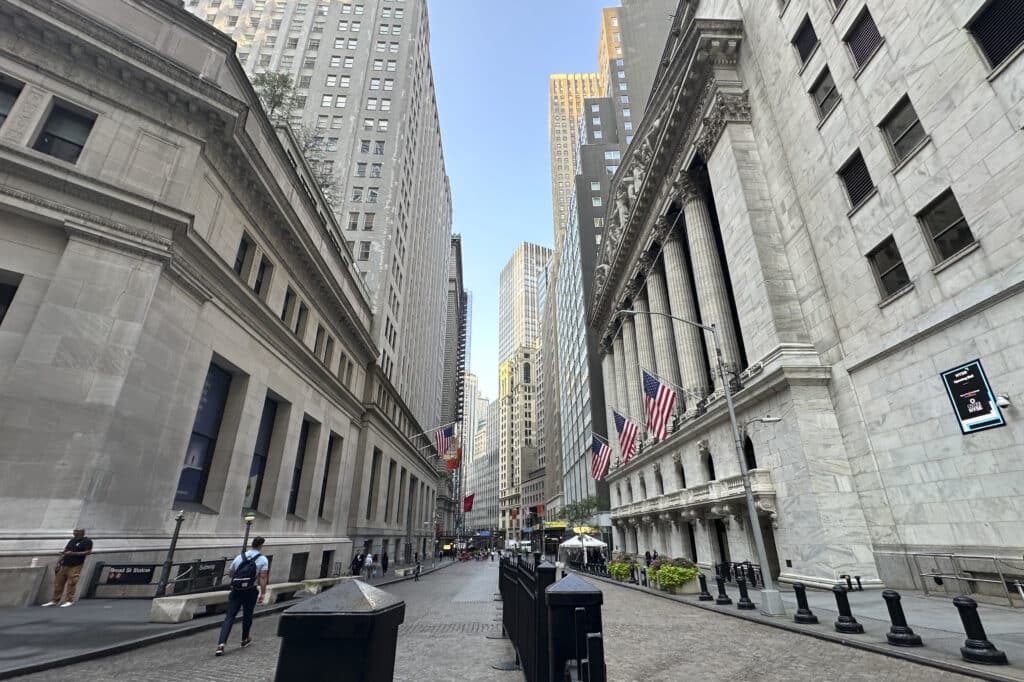
The New York Stock Exchange, at right, is shown on Wednesday, Aug. 14, 2024, in New York. (AP Photo/Peter Morgan)
NEW YORK — Wall Street rallied to one of its best days of the year Thursday after data showed the U.S. economy is holding up better than expected, with particular credit going to the country’s shoppers.
The S&P 500 jumped 1.6% for its fourth-best day of the year and its sixth straight gain as the U.S. stock market rights itself following a scary few weeks. It’s back to within 2.2% of its all-time high set last month after briefly falling close to 10% below it.
The Dow Jones Industrial Average rose 554 points, or 1.4%, while the Nasdaq composite burst 2.3% higher as Nvidia and other Big Tech stocks recovered more of their stumbles from the last month.
READ: Asian stocks follow Wall Street climb
Treasury yields also leaped in the bond market following the encouraging economic report. One said U.S. shoppers increased their spending at retailers last month by much more than economists expected, while another said fewer U.S. workers applied for unemployment benefits.
A year ago, such reports could have sent the stock market reeling on worries they would push inflation higher. But good news for the economy is once again good news for Wall Street, particularly after a report showed U.S. employers pulled back on their hiring last month by much more than expected.
That dud of a jobs report raised worries the U.S. economy could buckle under the weight of high interest rates brought by the Federal Reserve, and it contributed to turmoil in stock markets worldwide. But Thursday’s reports hint a perfect landing may still be possible, one where the Fed slows the economy’s growth by just enough through high rates to stifle inflation but not so much that it causes a recession.
“The growth scare isn’t over, but it’s a little less scary,” said Brian Jacobsen, chief economist at Annex Wealth Management.
Inflation has also been improving since it topped 9% two summers ago, punctuated by reports earlier this week on prices at both the consumer and wholesale levels. That has cleared the way for the Federal Reserve to soon deliver the cuts to interest rates that Wall Street loves.
Walmart added to the optimism after it delivered a bigger profit for the spring than analysts expected, and its shares climbed 6.6% The retail giant also raised its forecast for sales for the full year, indicating U.S. shoppers can keep spending. Such spending by U.S. consumers makes up the bulk of the economy.
READ: US producer inflation cooler than expected in July
It was just one of several big companies to join the parade of businesses topping analysts’ expectations for springtime profit.
Deere & Co. rode 6.3% higher after the seller of backhoes, dozers and other equipment reported higher profit and revenue than expected. That was despite what it called challenging conditions across the agricultural and construction sectors globally.
Cisco Systems’ profit and revenue for the latest quarter squeaked past analysts’ forecasts, and its stock jumped 6.8% after the maker of networking equipment also said it would eliminate thousands of jobs as it shifts to faster-growing areas of technology like artificial intelligence.
Ulta Beauty’s stock rose 11.2% to help lead the market after Warren Buffett’s Berkshire Hathaway revealed it has built an ownership stake in the retailer.
All told, the S&P 500 rose 88.01 points to 5,543.22. The Dow gained 554.67 to 40,563.06, and the Nasdaq composite rallied 401.89 to 17,594.50.
In the bond market, the 10-year Treasury yield clambered up to 3.91% from 3.84% late Wednesday following the strong economic data.
The two-year Treasury yield, which more closely follows expectations for action by the Federal Reserve, jumped to 4.09% from 3.96% late Wednesday.
Traders still widely expect the Federal Reserve to cut its main interest rate at its next meeting in September, which would be the first such cut since the 2020 COVID crash. But they’re now largely expecting the Fed to lower rates by the traditional quarter of a percentage point, according to data from CME Group.
A week ago, many traders were forecasting a more severe cut of half of a percentage point because of worries at the time that the U.S. economy’s growth was sliding.
The Fed has been clear about the tightrope it began walking when it started hiking rates sharply in March 2022: Being too aggressive would choke the economy, but going too soft would give inflation more oxygen and hurt everyone.
The signals of a resilient U.S. economy helped drive smaller stocks in particular on Thursday. Smaller companies can be more beholden to the strength of the U.S. economy than huge multinationals, and the Russell 2000 index of smaller stocks rose 2.5% to help lead the market.
Smaller stocks have been even jumpier than the rest of the market, rising more than the S&P 500 when data indicate the U.S. economy is doing well and interest rates are about to come down, but tumbling more sharply when pessimism rises.
In stock markets abroad, indexes also rose in much of Asia and Europe.
Japan’s Nikkei 225 rose 0.8% after data showed its economy returned to growth during the spring. The U.K. economy also grew during the latest quarter, a welcome signal following a rough run, and the FTSE 100 rose 0.8% in London.

